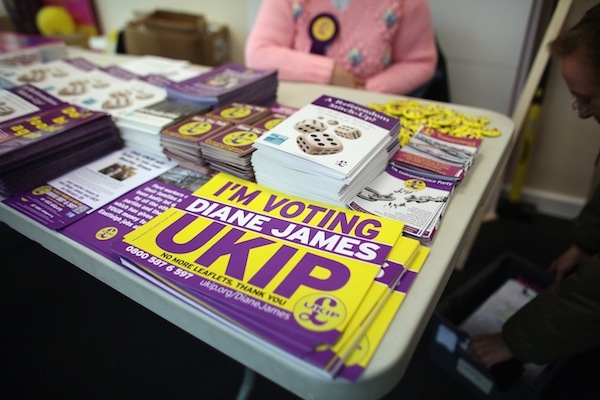Who are all these folk jumping on Nigel Farage’s bandwagon? Ukip — which received just 3 per cent of the vote in 2010 — is now averaging about 11 per cent in the polls. Its rise has fuelled all sorts of speculation about where its supporters are coming from and why they’re turning to the party. Today, YouGov have thrown a bit of data into that speculation. They’ve combined the results of all their February polls, which sampled 28,944 people including 2,788 who said they’d vote Ukip. The results are a mixture of the expected and the surprising.
First, the expected: most of them voted Tory in 2010 — 60 per cent of them, in fact. 15 per cent of them voted Liberal Democrat, 12 per cent Ukip and 7 per cent Labour.

It might seem surprising that so many have switched from the europhile Lib Dems to eurosceptic Ukip, but, as YouGov president Peter Kellner says, ‘they are the kind of Lib Dem voters whose choice was driven by a dislike for the two big parties rather than enthusiasm for Brussels.’
But Ukip voters are not as right-wing as you might expect (or at least they don’t see themselves that way). Just 46 per cent describe themselves as right-wing or right-of-centre, compared to 60 per cent of Tory voters. 23 per cent place themselves in the centre and 13 per cent on the left.

Most of the rest of the findings fit with the common view of Ukip voters. They are more likely to be male, old, working class, religious and to read the Daily Mail, the Express or the Sun than the electorate as a whole. They are less likely to have stayed in education beyond the age of 16, to have gone to university or to earn more than £40,000 a year.

So what conclusions can we draw from all this? Certainly, Ukip’s rise is a problem for the Conservatives — around one-in-seven of their 2010 voters now back Ukip. But tacking right is unlikely to help much, given that Ukip supporters seem to less right-wing than the remaining Tories. More pressing is the party’s need to better connect with working-class voters. But there’s a glimmer of hope for Cameron too: by almost three-to-one, Ukip voters would prefer a Tory government led by him to a Miliband-led Labour one. If the Conservatives can make the next election a clear-cut choice between the two, they should be able to persuade a lot of Ukip supporters back into their camp.






Comments